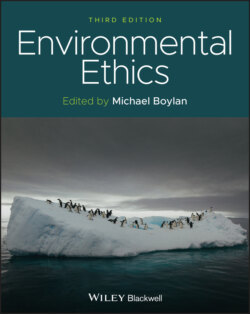Читать книгу Environmental Ethics - Группа авторов - Страница 40
How to Legislate Temperance?
ОглавлениеAnalysis of the pollution problem as a function of population density uncovers a not generally recognized principle of morality, namely: the morality of an act is a function of the state of the system at the time it is performed (10). Using the commons as a cesspool does not harm the general public under frontier conditions, because there is no public; the same behavior in a metropolis is unbearable. A hundred and fifty years ago a plainsman could kill an American bison, cut out only the tongue for his dinner, and discard the rest of the animal. He was not in any important sense being wasteful. Today, with only a few thousand bison left, we would be appalled at such behavior.
In passing, it is worth noting that the morality of an act cannot be determined from a photograph. One does not know whether a man killing an elephant or setting fire to the grassland is harming others until one knows the total system in which his act appears. “One picture is worth a thousand words,” said an ancient Chinese; but it may take 10,000 words to validate it. It is as tempting to ecologists as it is to reformers in general to try to persuade others by way of the photographic shortcut. But the essense of an argument cannot be photographed: it must be presented rationally—in words.
That morality is system-sensitive escaped the attention of most codifiers of ethics in the past. “Thou shalt not…” is the form of traditional ethical directives which make no allowance for particular circumstances. The laws of our society follow the pattern of ancient ethics, and therefore are poorly suited to governing a complex, crowded, changeable world. Our epicyclic solution is to augment statutory law with administrative law. Since it is practically impossible to spell out all the conditions under which it is safe to burn trash in the back yard or to run an automobile without smog control, by law we delegate the details to bureaus. The result is administrative law, which is rightly feared for an ancient reason—Quis custodiet ipsos custodes? —“Who shall watch the watchers themselves?” John Adams said that we must have “a government of laws and not men.” Bureau administrators, trying to evaluate the morality of acts in the total system, are singularly liable to corruption, producing a government by men, not laws.
Prohibition is easy to legislate (though not necessarily to enforce), but how do we legislate temperance? Experience indicates that it can be accomplished best through the mediation of administrative law. We limit possibilities unnecessarily if we suppose that the sentiment of Quis custodiet denies us the use of administrative law. We should rather retain the phrase as a perpetual reminder of fearful dangers we cannot avoid. The great challenge facing us now is to invent the corrective feedbacks that are needed to keep custodians honest. We must find ways to legitimate the needed authority of both the custodians and the corrective feedbacks.
